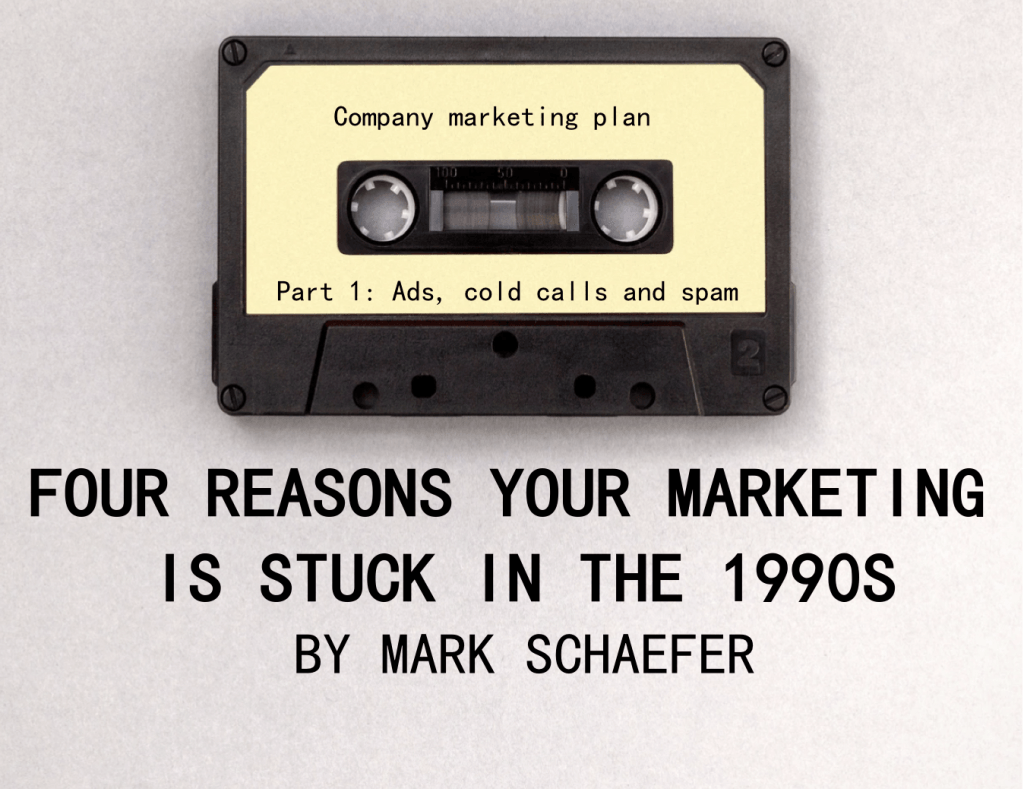
By Mark Schaefer
I recently had an opportunity to do a deep dive into the marketing operation of a Fortune 100 company. In 2010 they wisely created a social media department to produce approved content for their thousands of affiliates around the country. But all the affiliates will tell you that in our current era, the content is entirely worthless, a complete waste of money with zero results.
And yet, this department continues to do its job, day-in, day-out chunking out useless bits of Facebook pablum.
This is not an unusual scenario. I have an opportunity to interact with leaders from many companies around the world and I’m beginning to come to a conclusion.
Marketing is stuck.
Everywhere.
Companies big and small seem to be “locked-in” to marketing programs that simply cannot work any more because they have not adjusted to the new world realities.
I see so many businesses marketing the same way, advertising the same way, engaging on social media the same way that they did five or ten years ago. In reality, it’s unlikely that anything that worked 12 months ago, let alone five years ago, is just as effective today. But companies aren’t adjusting.
Let’s take a look at the reasons why we’re in this mess.
The disrupted consumer journey
I was recently reading a landmark research report from McKinsey that revealed how marketing has been flipped on its head.
The report showed how outreach of consumers to marketers has become dramatically more important than marketers’ outreach to consumers. Marketing used to be driven by companies — “pushed” on consumers through traditional advertising, direct marketing, sponsorships, and other channels. At each point in the funnel, as consumers whittled down their brand options, marketers would attempt to sway their decisions. This imprecise approach often failed to reach the right consumers at the right time.
Today, customers are driving the decision journey.
Consumers have seized control of the process and actively “pull” information helpful to them. The research found that two-thirds of the touch points during the evaluation phase of a purchase involve human-driven marketing activities like Internet reviews, social media conversations, and word-of-mouth recommendations from friends and family.
Let that sink in a moment. Two-thirds of the marketing efforts are probably going on without you, or at least in ways unfamiliar to the traditional marketing function.
The implication is that most companies have their marketing backwards. Instead of pushing deals and incentives, the most important marketing occurs after the sale. Word of mouth recommendations post-sale are driving new sales more than push marketing “deals.”
Marketing departments are stuck
Now here’s the kicker.
That McKinsey article was written in 2009.
As marketers, we’ve had a clue that the world was changing even back then. But look all around you. How many car companies are still pushing deals on you through stupid TV ads like they have for decades? How many complaints do you see on social media harping about inexcusable customer service? How many companies stalk you, annoy you, spam you relentlessly?
Why are marketers stuck in 2010? There are four reasons:
The crushing pace of technological change — A feeling of helplessness about the pace of change leads to uncertainty about direction, effectiveness, and even personal relevance as a marketing leader. Marketers rely on what they’ve always done because they don’t understand the changing world.
Over-reliance on technology and automation — Today, marketing has become a glorified IT department. Marketing decisions are being made by statisticians and data scientists in ways that may increase efficiency – and maybe even sales leads — but drive us away from the heart of our customers.
Organizational paralysis — Companies formed departments and teams years ago to work on social media, content, and other initiatives that don’t work like they used to. Becoming “locked-in” to marketing tactics that simply don’t work any longer might be due to outdated agency relationships, organizational resistance, cultural obstinance, lack of skilled leadership, relentless bureaucracy … or some combination of these factors.
Tech is changing consumer behavior dramatically — The methods of product discovery, acquisition, and delivery have been revolutionized. Hyper-empowered consumers are less loyal, more informed, and less trusting of companies and brands than any other time in history. But many companies have not reacted to this reality.
Getting un-stuck
As I think about my own work in consulting, teaching and speaking, it occurs to me that this is the biggest problem we need to overcome. Marketing needs to wake up, and fast.
Yes, the world has changed fast. But here is a chilling thought. In this day, in this moment, we are in the slowest period of change we will ever witness.
Competing effectively now and in the future will be less dependent on the classic “Four P’s of marketing” and more aligned with an ability to be nimble and adjust, adjust, adjust. This should be the most urgent priority at every company, but it’s just not happening in most places I encounter in my journeys.
Are you stuck? What are you doing about it?
 Mark Schaefer is the chief blogger for this site, executive director of Schaefer Marketing Solutions, and the author of several best-selling digital marketing books. He is an acclaimed keynote speaker, college educator, and business consultant. The Marketing Companion podcast is among the top business podcasts in the world. Contact Mark to have him speak to your company event or conference soon.
Mark Schaefer is the chief blogger for this site, executive director of Schaefer Marketing Solutions, and the author of several best-selling digital marketing books. He is an acclaimed keynote speaker, college educator, and business consultant. The Marketing Companion podcast is among the top business podcasts in the world. Contact Mark to have him speak to your company event or conference soon.


